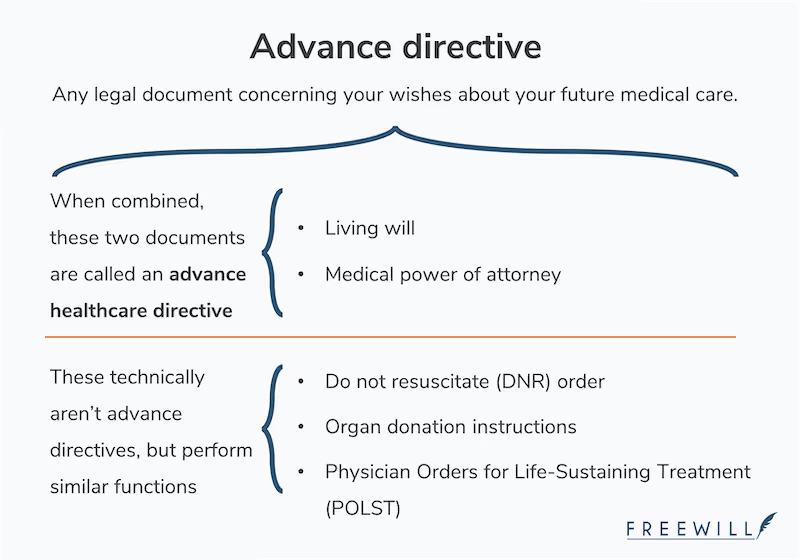There may come a time in your life when, due to an injury, old age, or failing health, you can no longer communicate your wishes about your medical treatment. Advance directives and living wills are legal documents that help you plan for these scenarios by leaving clear instructions about your preferred medical care and who should make treatment decisions for you.

So what’s the difference between an advance directive and a living will? The short answer is that a living will is a type of advance directive, while “advance directive” is a broad term used to describe any legal document that addresses your future medical care. Living wills are advance directives, but not all advance directives are living wills.
What is an advance directive?
Broadly, an advance directive is any legal document that addresses your wishes about your future medical care. Doctors refer to your advance directives if you’re ever incapacitated and unable to communicate. This could happen if you:
- Were in a coma
- Had a stroke
- Suffered from dementia
- Were under anesthesia
- Had an illness that left you too sick to communicate
You can customize your advance directive to reflect any religious, spiritual, or philosophical beliefs you have that may impact what kind of healthcare you want to receive. It’s a good idea to make these beliefs known in your advance directive, so your healthcare providers can respect them.
Advance directives sometimes go by different names depending on which state you live in. For example, advance directives can also be called:
- Healthcare directives
- Advance medical directives
- Advance care directives
- Designations of health care surrogate
- Health care proxies
There are several types of advance directives, and they often overlap in what topics they cover and when they go into effect, so it’s likely you’ll find a document that suits your needs.
What is a living will?
A living will is a type of advance directive in which you specify the medical treatments, procedures, and medications you do or don’t want to receive. If you’re ever incapacitated and can’t speak for yourself, your healthcare agent and doctors will consult the healthcare instructions in your living will.
Like advance directives, living wills also go by different names in different states, including:
- Medical directives
- Advance healthcare directives (AHCD)
Why the difference between advance directives and living wills can be confusing
Despite what we’ve outlined here, sometimes the difference between advance directives and living wills is hard to define. Here are a few reasons why:
- There aren’t any exact rules for what should be included in an advance directive. The scope can be broad (encompassing all healthcare decisions) or narrow (focusing on a specific procedure), depending on what you want to include.
- States have different laws on what they consider a valid advance directive. For example, some states allow verbal advance directives while others don’t.
- The names for advance directives and living wills vary from state to state. Sometimes these terms are even used interchangeably, which can be confusing.
The difference between an advance directive and a living will depends on which state you live in, and how the state defines each of these terms. You can check your state legislature’s website to figure out which terms your state uses.
Why you need an advance directive or living will
None of us ever plan to get ill or be injured. But sometimes unexpected things happen and, in the event your ability to communicate is affected, it’s best to be prepared.
Advance directives are an important estate planning tool because they let you plan ahead, preemptively making decisions for a “future you” that can’t. Advance directives let you control the healthcare you receive, and can protect your loved ones from the burden of having to guess what treatment you want. Advance directives also let you choose someone to make those treatment decisions for you if you’re someday unable to communicate your wishes. With an advance directive, your doctors and loved ones can make decisions about your medical care with confidence.
If you want to create a plan for the future, you can use FreeWill to make a living will today — completely free and finished in less than 20 minutes.
Make your free estate plan today

Make your free advance healthcare directive

Make your free durable power of attorney

Make a stock donation today

Make your free revocable living trust










